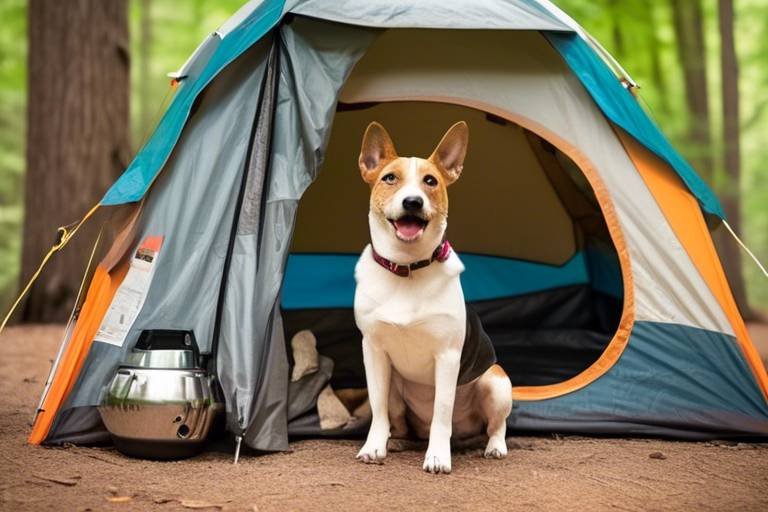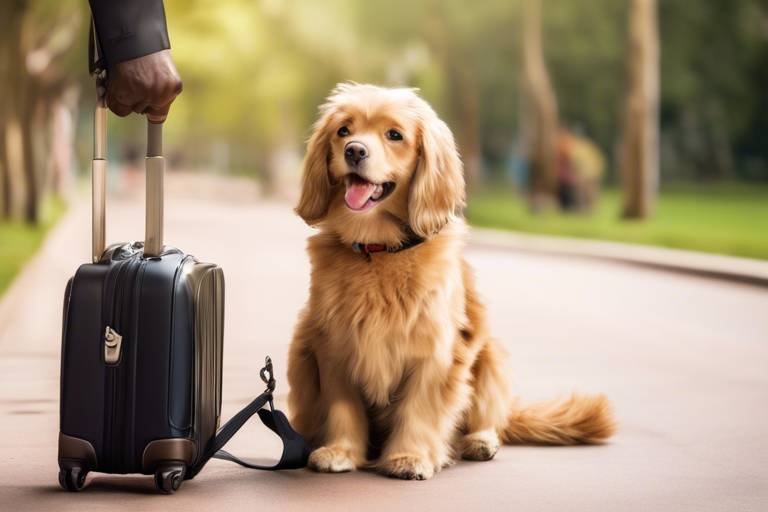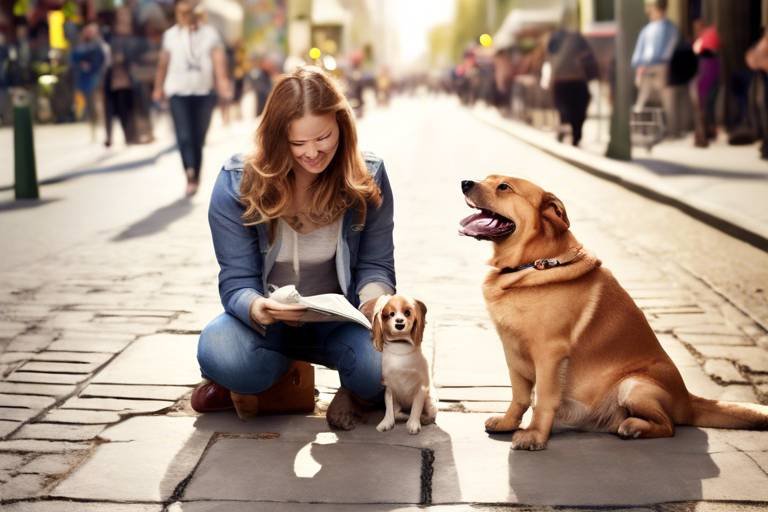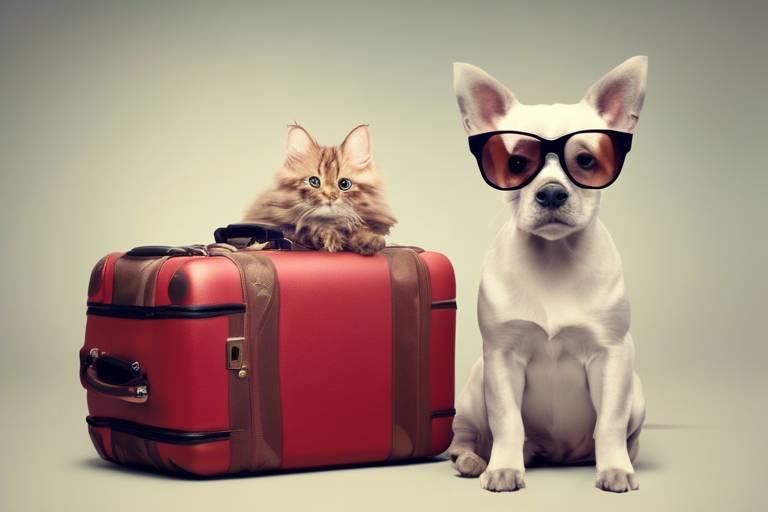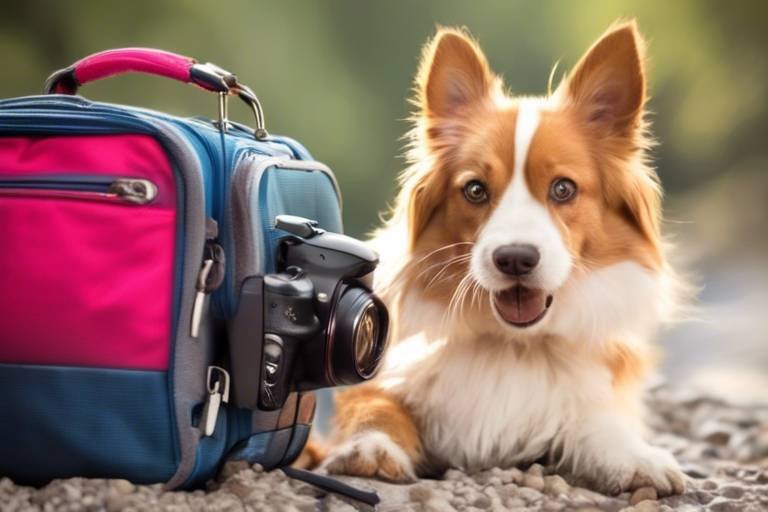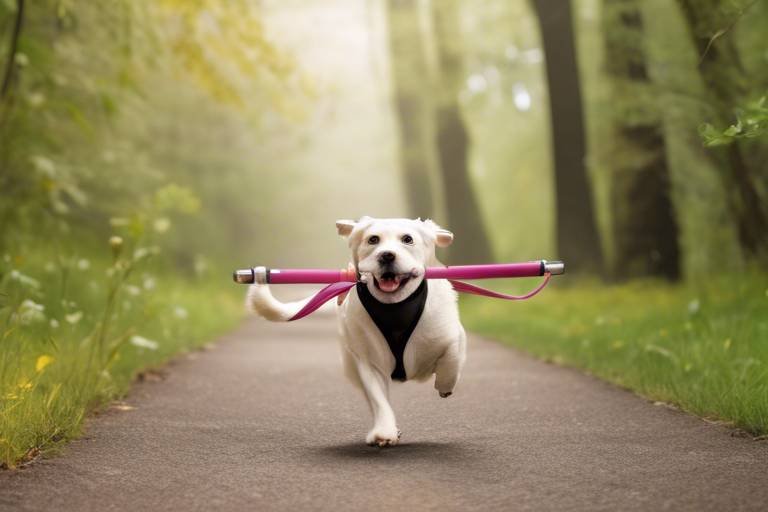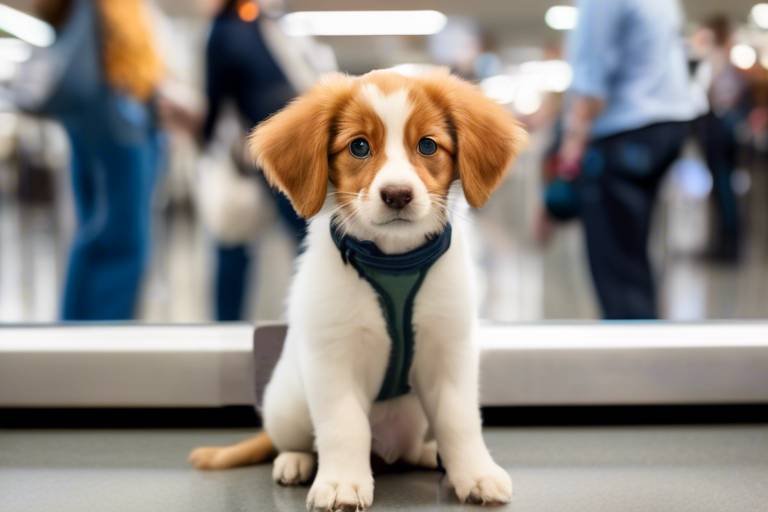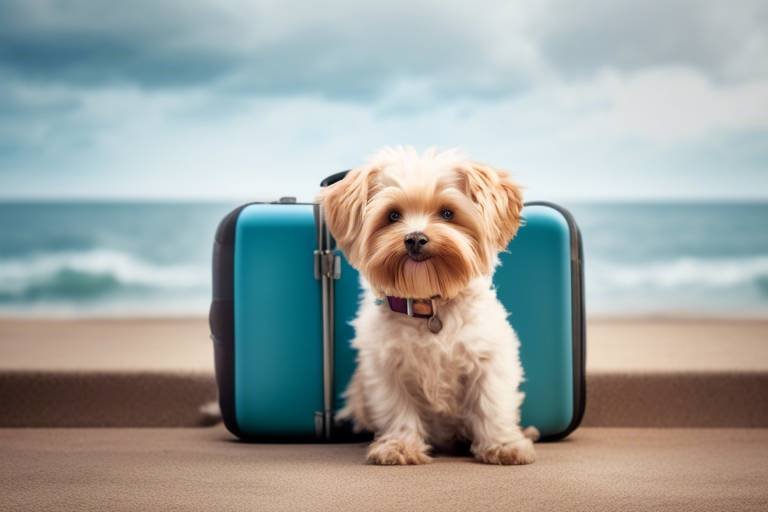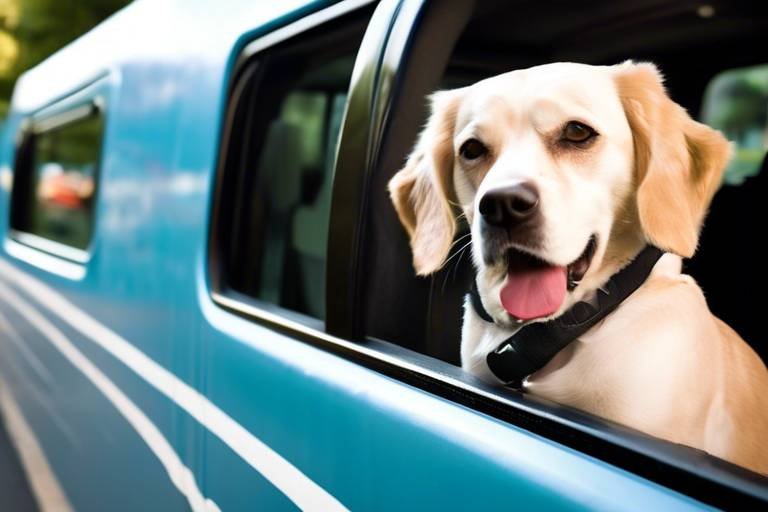How to Ensure Your Pet's Comfort During Hotel Stays
Traveling with your furry friend can be a delightful experience, but it also comes with its own set of challenges. Imagine this: You're all packed up, ready for a weekend getaway, but your pet is looking at you with those big, questioning eyes. You want them to enjoy the trip just as much as you do, right? Ensuring your pet's comfort during hotel stays is not just about finding a pet-friendly place; it's about creating a safe haven for them amidst the hustle and bustle of travel. In this article, we'll explore practical tips and strategies to make your pet feel comfortable and secure while staying in a hotel, ensuring a stress-free experience for both you and your furry friend.
Selecting a pet-friendly hotel is crucial. Not all hotels are created equal when it comes to accommodating our four-legged companions. Look for accommodations that cater specifically to pets, providing amenities and services designed to make your stay enjoyable and comfortable for your furry friend. This could mean anything from dog parks on the property to pet beds and bowls provided in the room. The right hotel can make a world of difference, turning a potentially stressful situation into a cozy retreat.
Before your hotel stay, it's essential to prepare your pet for travel. This includes familiarizing them with their travel crate and ensuring they have all necessary supplies for a smooth journey. Think of it like packing a suitcase for yourself; you want to have everything you need at your fingertips. If your pet is used to their crate, they’ll feel more secure during the journey. You might even want to take a few short trips in the days leading up to your hotel stay to help them get accustomed to traveling.
An essential packing list for your pet can help ensure you don't forget anything. Here’s a quick rundown:
- Food and Water: Bringing your pet's regular food and a portable water bowl can help maintain their routine. It also prevents digestive issues that may arise from sudden dietary changes while traveling.
- Comfort Items: Comfort items like blankets or favorite toys can provide a sense of security for your pet in an unfamiliar hotel room. Familiar scents can help soothe anxiety during the stay.
- Health Essentials: Don’t forget any medications or health records that might be necessary during your trip.
Once at the hotel, creating a comfortable environment for your pet is essential. Setting up their space can help them feel more at home and reduce stress. Think of it as setting up a cozy corner in a new house; a little effort can go a long way. Designating a specific area in the hotel room for your pet can help them feel secure. Use their bed or crate to create a familiar, safe space for relaxation. This small gesture can make your pet feel like they have a little piece of home with them.
Maintaining your pet's daily routine, including feeding and walking schedules, can help minimize anxiety. Just like humans, pets thrive on routine. Consistency in their routine can make hotel stays more enjoyable for your furry friend. Try to stick to their normal meal times and bathroom breaks. If they usually go for a walk in the morning, do your best to keep that schedule. It’s all about keeping things as normal as possible!
Keeping an eye on your pet's behavior during the hotel stay is crucial. Understanding their needs and emotions can help you address any discomfort or stress they may experience. Look for signs of stress, such as excessive barking, hiding, or pacing. If you notice these signs, it’s essential to take action quickly. Sometimes, just a little extra love and attention can work wonders. A gentle pet or a favorite toy may be all they need to feel more at ease.
Recognizing signs of stress in your pet can help you take action quickly. Common signs include:
- Excessive barking or whining
- Refusal to eat or drink
- Hiding or seeking isolation
- Pacing or restlessness
Addressing these signs can lead to a more pleasant hotel experience for both you and your pet.
If your pet shows severe signs of distress, knowing when to seek help from hotel staff or a veterinarian is essential. Don’t hesitate to reach out for assistance if you feel overwhelmed. Ensuring your pet's well-being should always be a priority, and there’s no shame in asking for help when you need it.
After your hotel stay, providing care and attention to your pet is essential. This helps them readjust to home life and recover from any travel-related stress. Just like you might feel a bit off after a long trip, your pet may need some extra love and reassurance to settle back in.
Reestablishing your pet's routine at home can help them feel secure again. Consistency in feeding, walking, and playtime can ease the transition back to normal life. Remember, your pet looks to you for guidance, so providing that stability can make all the difference.
After traveling, keep an eye on your pet's health. Look for any signs of illness or discomfort that may have arisen during the hotel stay, and consult a vet if needed. It’s always better to be safe than sorry, especially when it comes to the health of your furry friend.
Q: What should I look for in a pet-friendly hotel?
A: Look for hotels that offer pet amenities, such as pet beds, bowls, and nearby parks. Reading reviews from other pet owners can also provide valuable insights.
Q: How can I help my pet adjust to a new environment?
A: Bring familiar items like their bed or toys, maintain their routine, and provide plenty of love and attention during the stay.
Q: What if my pet shows signs of stress during our hotel stay?
A: Address their needs immediately, whether that means taking them for a walk, providing a favorite toy, or simply spending some quiet time together.

Choosing the Right Hotel
This article explores practical tips and strategies to make your pet feel comfortable and secure while staying in a hotel, ensuring a stress-free experience for both you and your furry friend.
When it comes to traveling with your beloved pet, can make all the difference. Not all hotels are created equal, especially when it comes to accommodating our furry companions. First and foremost, look for hotels that are explicitly labeled as pet-friendly. These establishments often provide amenities and services tailored to ensure both you and your pet have a comfortable stay. It’s not just about allowing pets; it’s about creating a welcoming environment for them.
Consider the following factors when selecting your hotel:
- Pet Policies: Always check the hotel’s pet policies. Some may have weight restrictions, breed restrictions, or additional fees for bringing pets. Understanding these rules beforehand can save you from unexpected surprises upon arrival.
- Amenities: Look for hotels that offer pet-specific amenities such as dog parks, pet beds, or even pet-sitting services. These features can greatly enhance your pet's experience and make your stay more enjoyable.
- Location: Choose a hotel that is conveniently located near parks or walking trails. This makes it easier to take your pet out for exercise and bathroom breaks.
Additionally, reading reviews from other pet owners can provide valuable insights into how well a hotel accommodates pets. Websites like TripAdvisor often have sections dedicated to pet-friendly reviews, where you can find first-hand experiences from fellow travelers. If you find a hotel that seems perfect but lacks detailed reviews, don’t hesitate to call and ask specific questions. A hotel that is genuinely committed to pet comfort will be happy to provide information and answer your concerns.
Lastly, consider the overall atmosphere of the hotel. A calm and welcoming environment can help your pet feel at ease. Avoid hotels that are known for being overly noisy or chaotic, as this can add unnecessary stress to your pet’s travel experience. Remember, the goal is to create a seamless transition for your furry friend from home to hotel. With a little research and planning, you can find the perfect spot that caters to both your needs and those of your pet.
Before your hotel stay, it's essential to prepare your pet for travel. This includes familiarizing them with their travel crate and ensuring they have all necessary supplies for a smooth journey.
An essential packing list for your pet can help ensure you don't forget anything. Include food, water, toys, and comfort items that will help your pet adjust to the new environment.
Bringing your pet's regular food and a portable water bowl can help maintain their routine. It also prevents digestive issues that may arise from sudden dietary changes while traveling.
Comfort items like blankets or favorite toys can provide a sense of security for your pet in an unfamiliar hotel room. Familiar scents can help soothe anxiety during the stay.
Taking health and safety precautions is vital when traveling with pets. Ensure your pet is up-to-date on vaccinations and has a proper identification tag for emergencies.
Once at the hotel, creating a comfortable environment for your pet is essential. Setting up their space can help them feel more at home and reduce stress.
Designating a specific area in the hotel room for your pet can help them feel secure. Use their bed or crate to create a familiar, safe space for relaxation.
Maintaining your pet's daily routine, including feeding and walking schedules, can help minimize anxiety. Consistency in their routine can make hotel stays more enjoyable for your furry friend.
Keeping an eye on your pet's behavior during the hotel stay is crucial. Understanding their needs and emotions can help you address any discomfort or stress they may experience.
Recognizing signs of stress in your pet, such as excessive barking or hiding, can help you take action quickly. Addressing these signs can lead to a more pleasant hotel experience.
If your pet shows severe signs of distress, knowing when to seek help from hotel staff or a veterinarian is essential. Ensuring your pet's well-being should always be a priority.
After your hotel stay, providing care and attention to your pet is essential. This helps them readjust to home life and recover from any travel-related stress.
Reestablishing your pet's routine at home can help them feel secure again. Consistency in feeding, walking, and playtime can ease the transition back to normal life.
After traveling, keep an eye on your pet's health. Look for any signs of illness or discomfort that may have arisen during the hotel stay, and consult a vet if needed.
Q: How do I find pet-friendly hotels?
A: Use travel websites or apps that filter hotels based on pet policies. You can also check hotel websites directly for their pet policies.
Q: Are there extra fees for bringing my pet?
A: Many hotels charge a pet fee, which can vary widely. Always check the hotel’s policy before booking.
Q: What should I do if my pet shows signs of stress during the stay?
A: Create a safe space for your pet, maintain their routine, and if necessary, consult hotel staff or a veterinarian.
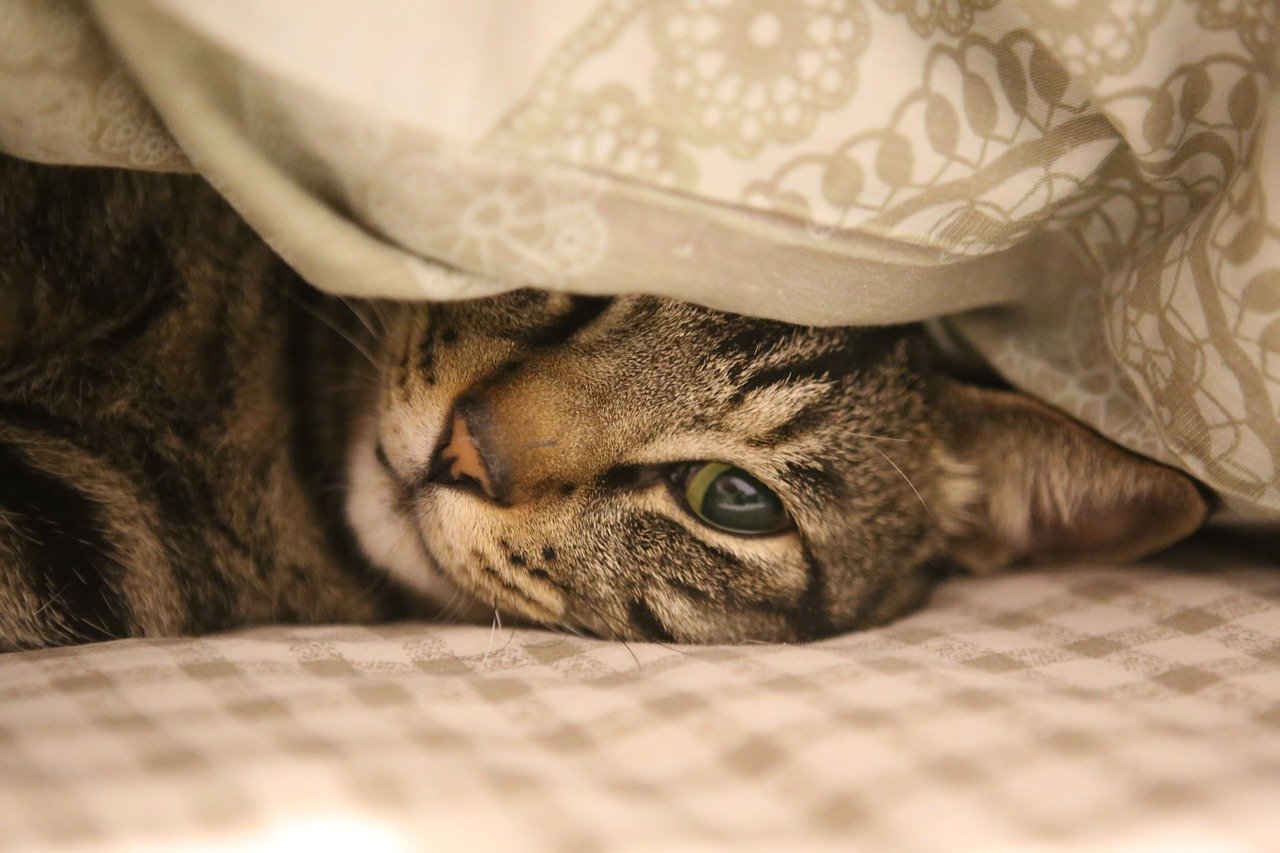
Preparing Your Pet for Travel
Traveling with your furry friend can be an exciting adventure, but it also requires careful preparation to ensure their comfort and safety. First and foremost, it's essential to familiarize your pet with their travel crate. This can be done by allowing them to explore it at home, making it a cozy space with their favorite blanket or toy. The more comfortable they feel in their crate, the less anxious they will be during the journey. It's like giving them a little piece of home to carry along!
Additionally, you should gather all the necessary supplies before you hit the road. Think of it as packing your own suitcase for a vacation; you wouldn't want to forget your essentials! Here’s a quick rundown of what you should include:
- Food and Water: Bring enough of your pet's regular food to last the trip, plus a portable water bowl to keep them hydrated.
- Comfort Items: Pack their favorite toys or a blanket to help soothe them in unfamiliar surroundings.
- Health Supplies: Don't forget any medications or health records your pet might need while traveling.
Moreover, it's crucial to plan for any potential travel disruptions. Whether it's a layover or a long drive, consider how your pet will manage during these times. If you're flying, check the airline's pet policy and ensure your pet is comfortable in their carrier. For road trips, frequent breaks for bathroom and stretching time are essential. Think of it as a mini road trip for your pet, where they can enjoy some fresh air and a little exercise!
Lastly, before you embark on your journey, it's a good idea to visit your veterinarian. Make sure your pet is up-to-date on vaccinations and discuss any travel-related concerns you might have. This way, both you and your pet can travel with peace of mind, knowing you’ve taken all the necessary precautions. After all, a well-prepared trip ensures that your furry friend will have a tail-wagging good time!
To make sure you don’t leave anything behind, here’s a quick packing list for your pet:
| Item | Purpose |
|---|---|
| Food | To maintain their regular diet |
| Water Bowl | For hydration during travel |
| Comfort Blanket | To provide a sense of security |
| Toys | For entertainment and stress relief |
| Health Records | In case of emergencies |
By taking these steps and preparing thoroughly, you can ensure that your pet feels comfortable and secure throughout your travels. Remember, a happy pet means a happy trip!
Q: How can I help my pet feel comfortable in a hotel room?
A: Bring familiar items like their bed, toys, and blankets to create a safe space. Setting up a designated area for them can also help.
Q: What should I do if my pet shows signs of stress while traveling?
A: Keep an eye on their behavior. If they seem anxious, try to comfort them with their favorite toy or blanket. If stress persists, consider consulting a veterinarian.
Q: Is it necessary to bring my pet's health records when traveling?
A: Yes, having their health records handy can be crucial in case of emergencies or if you need to visit a veterinarian while away.
Essential Packing List
When preparing for a hotel stay with your beloved pet, having an can make all the difference in ensuring a smooth and enjoyable experience. Think of it as your pet's travel survival kit! You wouldn’t want to forget their favorite toy or special food, right? So, let’s dive into what you should consider bringing along to make your furry friend feel right at home, even in a new environment.
First and foremost, food and water supplies are critical. Bringing your pet's regular food not only helps maintain their diet but also prevents any digestive issues that could arise from sudden changes in their meals. A portable water bowl is equally important; hydration is key, especially if you're traveling to a warmer climate. You might even want to pack some bottled water from home to avoid any stomach upsets due to different water sources.
Next, don’t forget about comfort items. These can include a cozy blanket, their favorite bed, or a couple of beloved toys. Familiar scents can work wonders in soothing anxiety and making your pet feel secure. Imagine how comforting it would be for you to curl up in your own blanket after a long day – your pet feels the same way! Having their comfort items can help them adjust to the new hotel room and make it feel less foreign.
Additionally, it's wise to pack a first-aid kit tailored for pets. This can include items like bandages, antiseptic wipes, and any medications your pet may need. Just like you wouldn’t travel without your health essentials, your pet deserves the same consideration. Being prepared can save you from a stressful situation if a minor mishap occurs.
Lastly, make sure to include identification and health records. In the unfortunate event that your pet gets lost, having an ID tag with your contact information is crucial. It's also a good idea to carry a copy of their vaccination records in case the hotel requires proof of vaccinations. You can even keep these documents in a waterproof pouch to ensure they stay safe during your travels.
Here’s a quick recap of your packing essentials:
- Food and water supplies
- Comfort items (blankets, toys)
- First-aid kit
- Identification and health records
By keeping this in mind, you'll be well-prepared to make your pet's hotel stay as comfortable and enjoyable as possible. Remember, the goal is to minimize stress for both you and your furry friend, so a little preparation goes a long way!
Q: What should I do if my pet refuses to eat while at the hotel?
A: It's not uncommon for pets to be a bit off their food in a new environment. Try offering their favorite treats or mixing in a bit of wet food to entice them. If they still refuse to eat after a day, consult with a veterinarian.
Q: How can I help my pet adjust to the hotel room?
A: Setting up a designated area for your pet with their bed and toys can help them feel more secure. Familiar scents and items can create a comforting atmosphere.
Q: Is it safe to leave my pet alone in the hotel room?
A: It’s generally best to avoid leaving your pet alone in a hotel room for extended periods. If you must leave them, make sure they are securely confined in their crate and consider using a pet camera to monitor their behavior.
Food and Water Supplies
When it comes to ensuring your pet's comfort during a hotel stay, play a pivotal role. Just like us, pets thrive on routine, and maintaining their normal eating and drinking habits can significantly reduce stress. Imagine being in a new place and suddenly having to eat something unfamiliar; it’s unsettling, right? To avoid this scenario, always pack your pet's regular food. This not only keeps their diet consistent but also helps prevent any digestive issues that can arise from sudden dietary changes.
In addition to food, having a portable water bowl is essential. Hydration is key, especially if your pet is traveling long distances or adjusting to a new environment. You wouldn’t want your furry friend to feel parched in a hotel room, would you? A collapsible water bowl is a great option as it’s easy to pack and use, allowing you to offer your pet fresh water whenever they need it. Make sure to fill it with water that they are used to, as even a change in water can be unsettling for some pets.
To make things even easier, you might want to consider creating a travel food station in your hotel room. This can be a simple setup where you designate a specific spot for your pet's food and water bowls. Having a consistent area for meals can help your pet understand that it’s time to eat, even in a new space. Plus, it keeps things tidy and organized, which is a bonus in a hotel setting.
Here’s a quick overview of what to pack for your pet’s food and water needs:
| Item | Description |
|---|---|
| Regular Food | Your pet's usual diet to maintain consistency. |
| Portable Water Bowl | A collapsible bowl for easy hydration on the go. |
| Treats | Familiar treats to comfort and reward your pet. |
| Measuring Cup | To ensure accurate feeding portions. |
In summary, preparing your pet's food and water supplies ahead of time can make a world of difference during your hotel stay. It not only keeps your pet comfortable but also gives you peace of mind knowing that their needs are being met. After all, a happy pet means a happy trip!
- What should I do if my pet refuses to eat in the hotel? - It's not uncommon for pets to feel uneasy in new environments. Try offering their favorite treats or engage them in play to distract them.
- How often should I offer water to my pet while traveling? - Make sure to offer water frequently, especially during long trips or if your pet seems to be panting or lethargic.
- Can I use hotel water for my pet? - If your pet is sensitive, it's best to stick with the water they are used to, especially if they have a history of stomach issues.
Comfort Items
When it comes to making your pet feel at ease during a hotel stay, play a pivotal role. Just like how we carry our favorite pillow or blanket when traveling, pets also benefit from familiar objects that can provide a sense of security. Imagine being in an unfamiliar place without your favorite belongings; it can be quite unsettling! That's why it's essential to pack a few comfort items that can help your furry friend adjust to their new surroundings.
One of the best comfort items you can bring is a favorite blanket. This blanket not only carries the scent of home but also offers a cozy spot for your pet to curl up on after a long day of travel. Additionally, including a favorite toy can serve as a great distraction and source of comfort. Whether it's a squeaky toy, a plush companion, or even a simple ball, having something familiar can make a world of difference.
Moreover, if your pet has a specific bed or crate they are used to, bringing it along can create a safe haven for them. Setting up their designated space in the hotel room with these items can help alleviate anxiety. It’s like creating a little sanctuary where they can retreat when things become overwhelming. Remember, the goal is to create a cozy environment that mirrors the comfort of home.
In addition to these items, consider packing a few of their favorite snacks. Treats can be an excellent way to reward your pet for being brave and adapting to their new environment. It’s also a great way to engage with them and reinforce positive behavior during the stay. Overall, these comfort items can be the key to ensuring that your pet feels relaxed and secure, turning what could be a stressful experience into a delightful adventure.
- What are the best comfort items to bring for my pet? Familiar blankets, favorite toys, and their regular bed or crate are excellent choices.
- How can I help my pet adjust to a hotel environment? Setting up a designated space with comfort items and maintaining their routine can help ease the transition.
- Is it necessary to bring my pet's food and water supplies? Yes, bringing their regular food and a portable water bowl is crucial to avoid digestive issues and ensure they stay hydrated.
- What should I do if my pet shows signs of stress during the hotel stay? Monitor their behavior closely and provide comfort items. If necessary, seek help from hotel staff or a veterinarian.
Health and Safety Precautions
When it comes to traveling with your beloved pet, ensuring their health and safety is paramount. Before embarking on your hotel adventure, it's essential to take a few precautionary steps to make sure your furry friend is in tip-top shape. Start by scheduling a visit to the veterinarian to ensure that your pet is up-to-date on all necessary vaccinations. This not only protects your pet but also helps prevent the spread of any contagious diseases to other animals they may encounter during your travels.
Additionally, it's crucial to equip your pet with proper identification. A sturdy collar with an ID tag that includes your contact information can be a lifesaver in case your pet gets lost. Microchipping is also a great option, providing a permanent form of identification that can help reunite you with your pet should the unexpected happen.
While packing your pet's belongings, don't forget to include any medications they may need. Organizing these supplies in a dedicated pouch or container can make it easier to access them during your stay. It's also wise to keep a copy of your pet's medical records with you, especially if your pet has any pre-existing conditions or requires special care. This information can be invaluable if you need to visit a local veterinarian while traveling.
Here’s a quick overview of essential health and safety precautions:
- Ensure your pet is up-to-date on vaccinations.
- Provide proper identification (ID tags and microchips).
- Pack necessary medications and medical records.
- Familiarize your pet with the hotel environment before arrival.
Lastly, it's always a good idea to research the hotel’s pet policy and nearby veterinary services. Knowing where to go in case of an emergency can save you a lot of stress. By taking these health and safety precautions seriously, you can ensure that your pet enjoys a safe and pleasant hotel experience, allowing you both to create wonderful memories together!
Q: What should I do if my pet shows signs of stress during the hotel stay?
A: If your pet exhibits signs of stress, such as excessive barking or hiding, try to create a calm environment by setting up their space with familiar items. If the behavior persists, consider taking a break outside for some fresh air or consulting hotel staff for assistance.
Q: Are there specific vaccines my pet needs before traveling?
A: It's best to consult your veterinarian for specific recommendations based on your pet's health history and the areas you plan to visit. Common vaccines include rabies, distemper, and Bordetella.
Q: Can I leave my pet alone in the hotel room?
A: While some pets may handle being left alone for short periods, it's generally advisable to avoid leaving them unattended for long durations. If you must leave them, consider using a pet-sitting service or check with the hotel for pet daycare options.
Q: What if my pet has special dietary needs?
A: If your pet has specific dietary requirements, pack their regular food and any supplements they may need. Stick to their usual feeding schedule to avoid digestive issues during your trip.

Creating a Comfortable Hotel Environment
Once you and your furry friend arrive at the hotel, the real work begins in creating a comfortable environment for them. It’s like setting up a cozy little nest in a new place, and trust me, your pet will appreciate the effort! Start by unpacking their belongings and setting them up in a designated area of the room. This could be a corner where they feel safe, perhaps near a window where they can watch the world go by or in a quiet spot away from the hustle and bustle of hotel life.
Designating a specific area in the hotel room not only helps your pet feel secure but also gives them a sense of ownership in a space that is otherwise unfamiliar. Use their favorite bed or crate to create this safe haven. Surround it with their toys, and perhaps even place a blanket that smells like home. Familiar scents can work wonders in soothing anxiety. Think of it as creating a mini home away from home for your pet, where they can retreat whenever they feel overwhelmed.
Maintaining a sense of routine is also crucial during your hotel stay. Pets thrive on consistency, and it’s essential to keep their daily schedules as close to normal as possible. This includes feeding times, walks, and play sessions. By sticking to their usual routine, you can significantly reduce their stress levels. Imagine how disorienting it would be to suddenly change your schedule while traveling—pets feel the same way!
As you settle in, take a moment to assess the hotel room for any potential hazards. Make sure there are no small items lying around that your pet could swallow or cords they could chew on. It’s like pet-proofing your space, ensuring that your pet can explore without any worries. If the hotel has amenities like a pet-friendly area or walking trails, make sure to take advantage of those. They can be great spots for your pet to stretch their legs and sniff around, which is vital for their mental and physical well-being.
Lastly, don’t forget to check in with your pet throughout your stay. Observe their behavior and be attentive to their needs. If they seem restless or anxious, a little extra playtime or a short walk can help alleviate their discomfort. Remember, a happy pet leads to a happy trip!
- What should I do if my pet is anxious in a hotel room? Try to create a familiar environment with their belongings and maintain their routine.
- Can I leave my pet alone in the hotel room? It’s best to avoid leaving them alone for extended periods, as this can increase their anxiety.
- Are there any hotels that offer special amenities for pets? Yes! Many pet-friendly hotels provide amenities like pet beds, bowls, and even pet-sitting services.
Setting Up a Safe Space
When you arrive at your hotel, the first thing you should do is create a safe space for your pet. This is crucial for helping them feel comfortable and secure in an unfamiliar environment. Think of it as setting up a cozy little nook where your furry friend can retreat and relax. Start by designating a specific area in the hotel room, ideally away from high-traffic zones and noise. You can use their bed or a familiar crate to create this sanctuary.
To make this safe space even more inviting, consider adding some of your pet's favorite items. For example, a blanket that smells like home can provide a sense of familiarity and comfort. You might also include a few of their favorite toys—these familiar objects can work wonders in alleviating anxiety and making them feel at ease. Think of it as creating a mini home away from home, a little slice of comfort amidst the chaos of travel.
It's also important to keep the area clean and free from any hazards. Check for anything that might be harmful to your pet, such as loose cords or sharp objects. You want to create a space where they can feel safe and secure without any worries. If your pet is crate-trained, placing their crate in the designated safe area can serve as an additional refuge. They can choose to retreat there whenever they feel overwhelmed, giving them the autonomy to manage their own comfort levels.
Lastly, be patient as your pet adjusts to this new space. Just like us, pets need time to adapt to new surroundings. Give them the opportunity to explore their safe area at their own pace. If they seem hesitant, don't force them; instead, encourage them with gentle reassurances and perhaps a treat to make the experience more positive. Remember, the goal is to create a sanctuary where your pet feels loved and protected, allowing for a more enjoyable hotel stay for both of you.
- What should I bring for my pet to ensure they feel comfortable in a hotel? It's essential to bring their favorite blanket, toys, food, and water supplies to help them feel at home.
- How can I tell if my pet is stressed in a hotel environment? Look for signs such as excessive barking, hiding, or changes in eating habits. These can indicate that your pet is feeling anxious.
- Is it safe to leave my pet alone in the hotel room? It depends on your pet's behavior. If they are crate-trained and comfortable in their space, it may be fine for short periods. However, always ensure they have access to water and a safe environment.
- What if my pet becomes ill during the hotel stay? If you notice any signs of illness, consult the hotel staff for recommendations on nearby veterinarians or emergency clinics.
Maintaining Routine
When you're away from home, maintaining your pet's routine can be a game-changer for their comfort and well-being. Imagine how you feel when your daily life gets disrupted—it's stressful, right? Well, our furry friends feel the same way! By keeping their schedule as consistent as possible, you can help ease their anxiety and make the hotel experience smoother for both of you.
Start by sticking to their usual feeding times. If your dog is accustomed to breakfast at 8 AM and dinner at 6 PM, do your best to replicate that schedule in the hotel. You might even consider using a portable pet feeding bowl to maintain that routine. This small gesture can provide a sense of normalcy for your pet amidst the unfamiliar surroundings.
Additionally, regular walks are essential. Not only do they help your pet relieve themselves, but they also provide an opportunity for exploration and exercise, which can be quite stimulating. Try to find a nearby park or a safe area where you can walk your pet. This not only keeps them physically active but also gives them a chance to sniff around and discover new scents, which can be a fun distraction from the hotel environment.
Don't forget about playtime! Bringing along a few of their favorite toys can help maintain their mental stimulation. Schedule short play sessions throughout the day, just like you would at home. This will not only keep them entertained but also strengthen your bond during your travels. Remember, a happy pet equals a happy owner!
Lastly, consider incorporating some quiet time into their routine. After all the excitement of travel and new experiences, your pet will need some downtime to recharge. Setting up a cozy corner in your hotel room with their blanket or bed can create a perfect little sanctuary for them to relax. This way, they can retreat to their safe space whenever they feel overwhelmed.
In summary, keeping a routine while staying in a hotel is crucial for your pet's comfort. By sticking to their feeding and walking schedules, providing playtime, and ensuring they have quiet moments, you can help them feel more secure and relaxed. After all, a well-adjusted pet means a stress-free trip for you!
- How can I help my pet adjust to a new hotel environment?
Start by maintaining their routine, bringing familiar items, and creating a safe space in the hotel room. - What should I do if my pet shows signs of stress during the hotel stay?
Monitor their behavior closely and address any signs of discomfort immediately. If necessary, seek help from hotel staff or a veterinarian. - Are there specific hotels that cater to pets?
Yes, many hotels offer pet-friendly accommodations with amenities designed for pets. Always check in advance to ensure the hotel meets your needs.
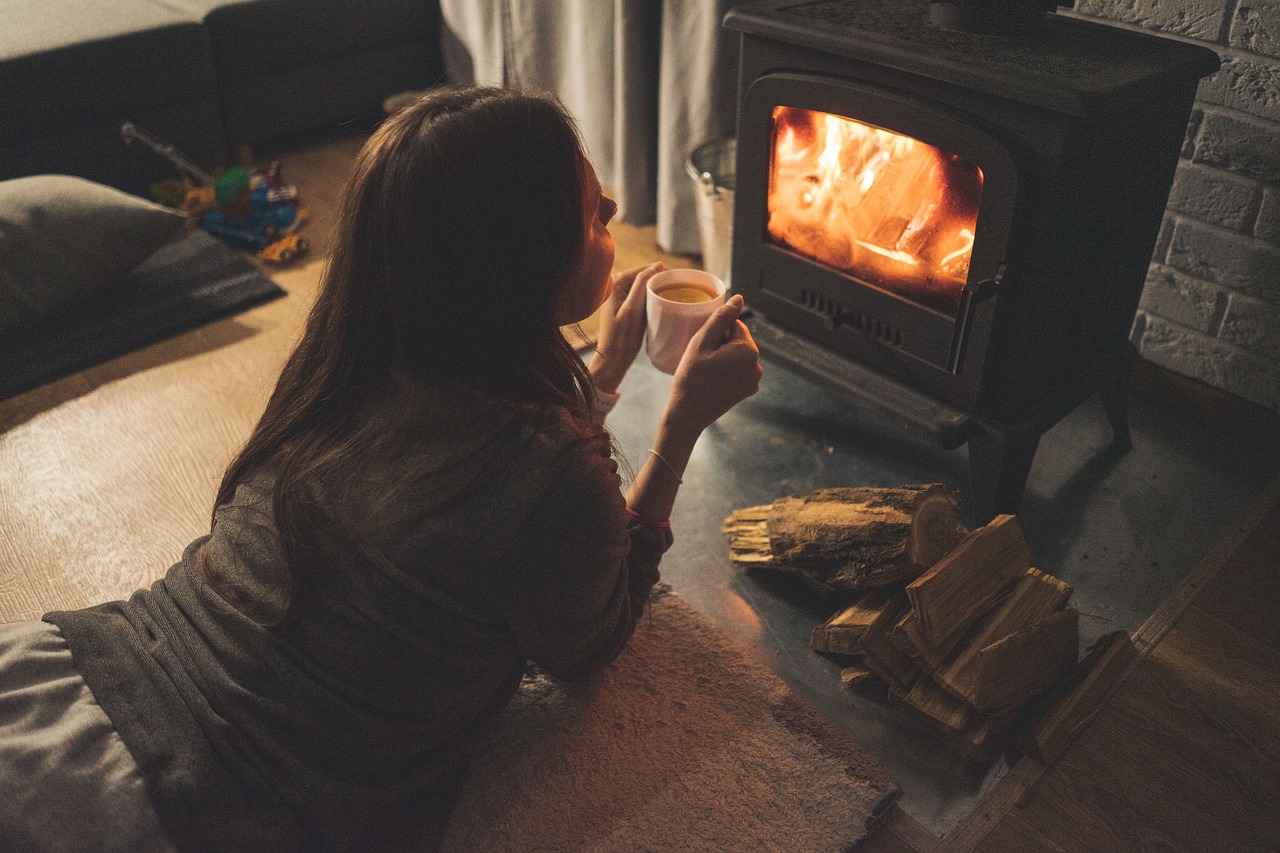
Monitoring Your Pet's Behavior
When you’re away from home, it’s natural to worry about your furry friend adjusting to the new environment. during your hotel stay is crucial for ensuring their comfort and well-being. Pets can be sensitive to changes in their surroundings, and understanding their needs can help you address any discomfort they may experience. Just like humans, pets can feel anxious in unfamiliar places, so keeping a close eye on their behavior can make a world of difference.
One of the first things to look for is signs of stress. These can manifest in various ways, including excessive barking, whining, or even hiding in a corner of the room. If you notice your pet acting differently than usual, it’s essential to take action. For example, if your dog is barking non-stop, it could be a sign that they are feeling insecure. On the other hand, if they are hiding, it might indicate that they are overwhelmed by the new environment. Recognizing these signs early can help you implement strategies to soothe their anxiety.
To help you identify potential signs of stress, consider the following common behaviors:
- Excessive barking or meowing: This could indicate frustration or anxiety.
- Hiding or seeking isolation: If your pet retreats to a corner or under the bed, they may be feeling scared.
- Destructive behavior: Chewing on furniture or scratching at doors could be a sign of distress.
- Refusal to eat or drink: A sudden loss of appetite can be a significant indicator that something is wrong.
It’s important to remember that every pet is unique, and their reactions may vary. Some pets may adapt quickly to new situations, while others may take longer to feel comfortable. If your pet shows signs of distress, consider creating a calm environment by speaking softly to them or engaging them in their favorite activities. Bringing along familiar items, such as their favorite blanket or toy, can also help them feel more secure.
In instances where your pet exhibits severe signs of distress, knowing when to seek help is vital. Don’t hesitate to reach out to hotel staff or even a veterinarian if your pet’s behavior becomes concerning. After all, their well-being should always be a priority. By keeping a watchful eye on your pet and responding promptly to their needs, you can help ensure a more enjoyable hotel experience for both of you.
| Question | Answer |
|---|---|
| What are some common signs of stress in pets during travel? | Common signs include excessive barking, hiding, destructive behavior, and loss of appetite. |
| How can I help my pet feel more comfortable in a hotel? | Bring familiar items like toys and blankets, maintain their routine, and create a safe space in the room. |
| When should I seek help for my pet's behavior? | If your pet shows severe signs of distress, such as persistent hiding or refusal to eat, it's time to consult hotel staff or a veterinarian. |
Signs of Stress
When traveling with your furry friend, it's essential to be vigilant about their emotional state. Animals, much like humans, can experience stress, especially in unfamiliar environments such as hotel rooms. Recognizing the early can help you take the necessary steps to alleviate their discomfort. Some common indicators include:
- Excessive Barking or Whining: If your pet is vocalizing more than usual, it might be a sign of anxiety or discomfort.
- Hiding: If your pet seeks out corners or tries to hide under furniture, it indicates they are feeling overwhelmed.
- Loss of Appetite: A sudden disinterest in food can suggest that your pet is not feeling at ease.
- Restlessness: Pacing or inability to settle down can be a clear signal that your pet is anxious.
- Destructive Behavior: Chewing on furniture or scratching at doors can be a way for pets to cope with their stress.
It's crucial to observe your pet's behavior closely. If you notice any of these signs, take a moment to comfort them. Sometimes, just a gentle pat or a familiar toy can help soothe their nerves. Additionally, try to create a calm atmosphere in the hotel room. Soft music or white noise can work wonders in reducing anxiety levels.
Understanding your pet's body language is also key. For instance, if they are avoiding eye contact or have their ears pinned back, these are signs that they are feeling uneasy. Acknowledging these behaviors allows you to respond appropriately, whether it’s by providing a safe space or adjusting your plans to accommodate their needs.
In extreme cases, if your pet exhibits severe signs of distress, such as excessive panting or trembling, it may be time to consult with hotel staff or seek veterinary assistance. Your pet’s well-being should always be your top priority, and knowing when to act can make all the difference in ensuring a pleasant hotel experience for both of you.
- What should I do if my pet shows signs of stress during our hotel stay?
It's important to comfort your pet and create a calm environment. If their stress continues, consider reaching out to hotel staff or a veterinarian for advice. - How can I help my pet feel more comfortable in a hotel?
Bring familiar items from home, maintain their routine, and designate a safe space in the hotel room for them to relax. - Are there specific breeds that are more prone to stress while traveling?
While any pet can experience stress, some breeds are more sensitive. It's best to research your specific breed's tendencies and prepare accordingly. - Can I use calming products to help my pet during travel?
Yes, there are various calming sprays and supplements available that can help reduce anxiety in pets. However, consult your vet before using any new products.
When to Seek Help
Traveling with your pet can be a delightful experience, but it also comes with its own set of challenges. It's essential to be vigilant about your furry friend's well-being during your hotel stay. If you notice any signs of stress or discomfort, it’s crucial to take action. But when should you seek help? Here are some key indicators that it might be time to reach out for assistance:
- Severe Anxiety: If your pet is excessively barking, whining, or trying to escape their designated area, these could be signs of severe anxiety. This kind of behavior can escalate quickly, so it’s essential to address it promptly.
- Physical Symptoms: Watch for signs such as vomiting, diarrhea, or lethargy. These physical symptoms can indicate that your pet is not adjusting well to the new environment.
- Refusal to Eat or Drink: If your pet refuses food or water for an extended period, it could lead to dehydration or other health issues. This is a red flag that should not be ignored.
- Hiding or Withdrawal: If your pet is hiding in a corner or under the bed and showing little interest in their surroundings, this could signal distress. It's important to gently coax them out but also consider seeking help if they don’t respond.
In these situations, don’t hesitate to reach out to the hotel staff. Most pet-friendly hotels have protocols in place to assist guests with pets in distress. They may offer calming aids or even recommend local veterinarians who can provide immediate care. Remember, your pet's comfort and safety should always be your top priority. If the situation escalates, contacting a veterinarian is the best course of action. They can assess your pet's health and provide the necessary treatment to ensure a safe and enjoyable stay for both of you.
Here are some common questions pet owners have when staying in hotels with their furry friends:
- What should I do if my pet is not adjusting well?
If your pet is showing signs of distress, try to create a familiar environment with their belongings. If the behavior persists, seek help from hotel staff or a veterinarian. - Are there specific breeds that are more prone to stress during travel?
While all pets can experience stress, some breeds, especially those that are more sensitive or have anxiety issues, may need extra attention during travel. - Can I leave my pet alone in the hotel room?
It’s best to avoid leaving your pet alone for extended periods. If you must leave them, make sure they are comfortable and have access to food and water. - How can I help my pet feel more secure in a new environment?
Bringing familiar items like their bed, toys, and blankets can help ease their anxiety. Additionally, maintaining their routine as much as possible will provide comfort.

Post-Trip Care for Your Pet
After returning from a hotel stay, it's vital to give your furry friend some extra love and attention. Just like us, pets can feel the effects of travel, and they may need a little time to readjust to their home environment. One of the first things to focus on is reestablishing their routine. Pets thrive on consistency, and returning to familiar feeding, walking, and playtime schedules can help them feel secure again. Imagine how you would feel if your daily routine was suddenly disrupted; pets experience similar feelings of confusion and anxiety.
Another important aspect of post-trip care is monitoring for health issues. Traveling can expose pets to different environments, and sometimes that can lead to health complications. Keep an eye out for any unusual behavior or symptoms that may have arisen during your hotel stay. Signs to look for include changes in appetite, lethargy, excessive scratching, or any signs of distress. If you notice anything concerning, don’t hesitate to consult your veterinarian. Prevention and early detection are key!
To make this process easier, consider creating a simple checklist to ensure you cover all necessary aspects of care after your trip. Here’s a quick example:
| Care Aspect | Action |
|---|---|
| Routine | Reestablish feeding and walking schedules |
| Health Monitoring | Watch for signs of illness or discomfort |
| Comfort | Provide extra cuddles and playtime |
| Hydration | Ensure your pet has access to fresh water |
In addition to these steps, don’t underestimate the power of extra cuddles and playtime. After a trip, your pet may just want to snuggle up with you on the couch or play their favorite game. This not only helps them feel loved but also strengthens the bond between you two. Remember, your attention and affection can go a long way in helping them feel safe and secure after a change in environment.
Lastly, be patient with your pet during this transition period. Just like us, they may need some time to shake off the travel blues. Give them the space they need to adjust, and soon enough, they’ll be back to their happy, playful selves!
- How can I tell if my pet is stressed after traveling? Look for signs such as excessive barking, hiding, changes in appetite, or unusual behavior.
- What should I do if my pet gets sick after a trip? Monitor their symptoms closely and consult your veterinarian if you notice any concerning changes.
- How long does it usually take for a pet to readjust after traveling? Each pet is different, but most will start to feel normal within a few days once their routine is reestablished.
Reestablishing Routine
After a hotel stay, reestablishing your pet's routine is crucial for their emotional well-being. Just like humans, pets thrive on consistency and familiarity. When you return home, it's essential to get back to their normal schedule as quickly as possible. This means resuming their usual feeding times, walk schedules, and play sessions. Imagine how disorienting it would be for your furry friend to be uprooted from their home environment, only to return to a different routine. To ease this transition, consider the following:
- Feeding Schedule: Stick to the same meal times you had before the trip. This helps your pet feel secure and reduces anxiety.
- Exercise Routine: Regular walks and playtime are not only good for their physical health but also beneficial for their mental state.
- Quality Time: Spend extra time with your pet after the trip. Cuddles, games, and attention will reassure them that everything is back to normal.
Additionally, you might want to create a checklist to help you remember all the aspects of your pet's routine that need to be reinstated. This could include:
| Routine Aspect | Time | Notes |
|---|---|---|
| Feeding | 8:00 AM / 6:00 PM | Use the same food as before. |
| Walks | 9:00 AM / 5:00 PM | Stick to familiar routes. |
| Playtime | 3:00 PM | Include favorite toys. |
By following these steps, you're not just helping your pet adjust; you're also reinforcing the bond you share. Remember, a pet that feels secure in their routine is a happy pet. So, take the time to observe their behavior and make any necessary adjustments to ensure they feel at home once again.
- How long does it take for a pet to adjust after traveling?
Every pet is different, but most will start to feel comfortable again within a few days if their routine is reinstated promptly. - What should I do if my pet shows signs of anxiety after the trip?
Provide comfort items, maintain their routine, and consider consulting a veterinarian if anxiety persists. - Is it safe to travel with my pet during busy seasons?
Traveling during busy seasons can be stressful for pets. Ensure you have everything they need and consider quieter times if your pet is particularly anxious.
Monitoring for Health Issues
This article explores practical tips and strategies to make your pet feel comfortable and secure while staying in a hotel, ensuring a stress-free experience for both you and your furry friend.
Selecting a pet-friendly hotel is crucial. Look for accommodations that cater to pets, providing amenities and services designed to make your stay enjoyable and comfortable for your furry companion.
Before your hotel stay, it's essential to prepare your pet for travel. This includes familiarizing them with their travel crate and ensuring they have all necessary supplies for a smooth journey.
An essential packing list for your pet can help ensure you don't forget anything. Include food, water, toys, and comfort items that will help your pet adjust to the new environment.
Bringing your pet's regular food and a portable water bowl can help maintain their routine. It also prevents digestive issues that may arise from sudden dietary changes while traveling.
Comfort items like blankets or favorite toys can provide a sense of security for your pet in an unfamiliar hotel room. Familiar scents can help soothe anxiety during the stay.
Taking health and safety precautions is vital when traveling with pets. Ensure your pet is up-to-date on vaccinations and has a proper identification tag for emergencies.
Once at the hotel, creating a comfortable environment for your pet is essential. Setting up their space can help them feel more at home and reduce stress.
Designating a specific area in the hotel room for your pet can help them feel secure. Use their bed or crate to create a familiar, safe space for relaxation.
Maintaining your pet's daily routine, including feeding and walking schedules, can help minimize anxiety. Consistency in their routine can make hotel stays more enjoyable for your furry friend.
Keeping an eye on your pet's behavior during the hotel stay is crucial. Understanding their needs and emotions can help you address any discomfort or stress they may experience.
Recognizing signs of stress in your pet, such as excessive barking or hiding, can help you take action quickly. Addressing these signs can lead to a more pleasant hotel experience.
If your pet shows severe signs of distress, knowing when to seek help from hotel staff or a veterinarian is essential. Ensuring your pet's well-being should always be a priority.
After your hotel stay, providing care and attention to your pet is essential. This helps them readjust to home life and recover from any travel-related stress.
Reestablishing your pet's routine at home can help them feel secure again. Consistency in feeding, walking, and playtime can ease the transition back to normal life.
After a hotel stay, it's crucial to keep a watchful eye on your pet's health. Just like humans, pets can experience stress or minor ailments during travel, and being proactive can make all the difference. Look for common signs of health issues, such as changes in appetite, unusual lethargy, or digestive problems. These symptoms might indicate that your furry friend is not feeling their best.
To help you identify potential health concerns, consider the following:
- Appetite Changes: Is your pet eating less than usual? This could be a sign of stress or a stomach upset.
- Behavioral Changes: Are they more withdrawn or aggressive? Changes in behavior can indicate discomfort or anxiety.
- Physical Symptoms: Look for signs such as vomiting, diarrhea, or excessive scratching, which could signal health issues.
If you notice any of these issues, don't hesitate to consult a veterinarian. It's better to be safe than sorry! Even if your pet seems fine, a quick check-up can ensure they are in good health after the trip. Remember, our pets rely on us to keep them safe and healthy, so being vigilant is key.
- What should I do if my pet shows signs of stress during the hotel stay? - Try to create a calming environment, use comfort items, and maintain their routine. If stress persists, consult a vet.
- Are there specific hotels that are better for pets? - Yes, look for hotels that offer pet-friendly amenities like designated pet areas, pet beds, and easy access to outdoor spaces.
- How can I prepare my pet for hotel stays? - Familiarize them with their travel crate, pack their comfort items, and maintain their routine as much as possible.
Frequently Asked Questions
- What should I look for in a pet-friendly hotel?
When searching for a pet-friendly hotel, prioritize accommodations that offer amenities specifically designed for pets. Look for features like pet-friendly rooms, designated walking areas, and services such as pet-sitting or grooming. Reading reviews from other pet owners can also provide valuable insights into how welcoming a hotel really is.
- How can I prepare my pet for travel?
Preparing your pet for travel involves getting them accustomed to their travel crate and ensuring you have all the necessary supplies. Familiarize your pet with the crate by allowing them to explore it at home. Pack their food, water, favorite toys, and comfort items to help ease the transition to a new environment.
- What items should I include in my pet's packing list?
Your pet's packing list should include essential items like food, a portable water bowl, medications, and comfort items such as their favorite blanket or toy. Don't forget to bring any necessary health documents, like vaccination records, and an identification tag for emergencies.
- How can I create a comfortable environment for my pet in a hotel?
To create a comfortable hotel environment, set up a designated area for your pet with their bed or crate. Use familiar items like blankets and toys to provide a sense of security. Maintaining their daily routine for feeding and walks will also help your furry friend feel more at home.
- What are the signs that my pet is stressed during the hotel stay?
Watch for signs of stress in your pet, which may include excessive barking, hiding, or changes in eating habits. If you notice these behaviors, it’s important to address them promptly to ensure your pet feels safe and secure during your stay.
- When should I seek help for my pet while at a hotel?
If your pet exhibits severe signs of distress, such as continuous whining or refusal to eat, it’s crucial to seek help. Contact hotel staff for assistance or consult a veterinarian if necessary. Your pet's well-being should always come first!
- How can I help my pet readjust after returning home from a trip?
To help your pet readjust after a trip, reestablish their regular routine as soon as possible. Consistency in feeding, walking, and playtime will ease their transition back to home life. Also, monitor their health for any signs of discomfort or illness that may have developed during your travels.



